African American Authors
Cane by Jean Boomer
Race Music: Black Cultures from Bebop to Hip-Hop by Guthrie P. Ramsey
Teaching Community: A Pedagogy of Hope by Bell Hooks
Belonging: A Culture of Place by Bell Hooks
White Rage: The Unspoken Truth of Our Racial Divide by Carol Anderson
This Nonviolent Stuff'll Get You Killed: How Guns Made the Civil Rights Movement Possible by Charles E. Cobb Jr.
If I Could Write This in Fire by Michelle Cliff
Don't Call Us Dead: Poems by Danez Smith
The Souls of Black Folk by W. E. B. Du Bois
The Fire This Time: A New Generation Speaks About Race by Jesmyn Ward
Them Goon Rules: Fugitive Essays on Radical Black Feminism by Marquis Bey
Homegoing: A Novel by Yaa Gyasi
Between the World and Me by Ta-Nehisi Coates
The Cooking Gene: A Journey Through African American Culinary History in the Old South by Michael Twitty
Hood Feminism: Notes From the Women That a Movement Forgot by Mikki Kendall
Parable of the Sower by Octavia E. Butler
Belly of the Beast: The Politics of Anti-Fatness as Anti-Blackness by Da’Shaun L. Harrison
I Can't Date Jesus: Love, Sex, Family, Race, and Other Reasons I've Put My Faith in Beyoncé by Michael Arceneaux
The Hip Hop Wars: What We Talk About When We Talk About Hip Hop--and Why It Matters by Tricia Rose
One Person, No Vote: How Voter Suppression Is Destroying Our Democracy by Carol Anderson
No Name in the Street by James Baldwin
My Grandmother's Hands: Racialized Trauma and the Pathway to Mending Our Hearts and Bodies by Resmaa Menakem
Your Black Friend and Other Strangers by Ben Passmore
Black Marxism : The Making of the Black Radical Tradition by Cedric Robinson
Anarchism and the Black Revolution by Lorenzo Kom'boa Ervin
Not All Okies Are White : The Lives of Black Cotton Pickers in Arizona by Geta LeSeur
Nonfiction African American Stories
"Why Are All the Black Kids Sitting Together in the Cafeteria?" And Other Conversations About Race by Beverly Daniel Tatum
Black Girl Magic: Beyond the Hashtag Twenty-First-Century Acts of Self-Definition by Julia S. Jordan-Zachery and Duchess Harris
Race Music: Black Cultures from Bebop to Hip-Hop by Guthrie P. Ramsey
Black Slaves, Indian Masters: Slavery, Emancipation, and Citizenship in the Native American South by Barbara Krauthamer
The Fire This Time: A New Generation Speaks About Race by Jesmyn Ward
Them Goon Rules: Fugitive Essays on Radical Black Feminism by Marquis Bey
The Hip Hop Wars: What We Talk About When We Talk About Hip Hop--and Why It Matters by Tricia Rose
My Grandmother's Hands: Racialized Trauma and the Pathway to Mending Our Hearts and Bodies by Resmaa Menakem
A Terrible Thing to Waste: Environmental Racism and Its Assault on the American Mind by Harriet A. Washington
Your Black Friend and Other Strangers by Ben Passmore
Black Marxism : The Making of the Black Radical Tradition by Cedric Robinson
Anarchism and the Black Revolution by Lorenzo Kom'boa Ervin
Not All Okies Are White : The Lives of Black Cotton Pickers in Arizona by Geta LeSeur
Fiction African American Stories
Homegoing: A Novel by Yaa Gyasi
Cane by Jean Toomer
Parable of the Sower by Octavia E. Butler

Call Number: PS3539.O543 C3 1969
ISBN: 9780871405357
Publication Date: 1923
Also available as an ebook
Jean Toomer's Cane is one of the most significant works to come out of the Harlem Renaissance and is considered to be a masterpiece in American modernist literature due to its distinct structure and style. Visions of smoke, sugarcane, dusk, and flame permeate the Southern landscape: the Northern world is pictured as a harsher reality of asphalt streets. Impressionistic, sometimes surrealistic, the pieces are redolent of nature and Africa, with sensuous appeals to the eye and ear. First published in 1923 and told through a series of vignettes, Cane uses poetry, prose, and play-like dialogue to create a window into the varied lives of African Americans living in the rural South and urban North during a time when Jim Crow laws pervaded and racism reigned.

Call Number: ML3556 .R32 2003
ISBN: 9780520210486
Publication Date: 2003
Also available as an ebook
This powerful book covers the vast and various terrain of African American music, from bebop to hip-hop. Guthrie P. Ramsey, Jr., begins with an absorbing account of his own musical experiences with family and friends on the South Side of Chicago, evoking Sunday-morning worship services, family gatherings with food and dancing, and jam sessions at local nightclubs. This lays the foundation for a brilliant discussion of how musical meaning emerges in the private and communal realms of lived experience and how African American music has shaped and reflected identities in the black community. Deeply informed by Ramsey's experience as an accomplished musician, a sophisticated cultural theorist, and an enthusiast brought up in the community he discusses, Race Music explores the global influence and popularity of African American music, its social relevance, and key questions regarding its interpretation and criticism.
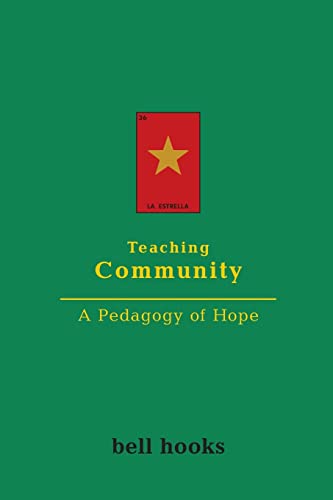
Call Number: LC196.5.U6 H66 2003
ISBN: 0415968178
Publication Date: 2003
Also available as an ebook
Combining critical thinking about education with autobiographical narratives, Hooks invites readers to extend the discourse of race, gender, class, and nationality beyond the classroom into everyday situations of learning. Bell Hooks writes candidly about her own experiences. Teaching, she explains, can happen anywhere, any time -- not just in college classrooms but in churches, in bookstores, in homes where people get together to share ideas that affect their daily lives.

Call Number: HQ503 .H76 2008
ISBN: 9780415968157
Publication Date: 2008
Also available as an ebook
Reflecting on the fact that 90% of all black people lived in the agrarian South before mass migration to northern cities in the early 1900s, Hooks writes about black farmers and black folks who have been committed both in the past and in the present to local food production, to being organic, and to finding solace in nature. Reflecting on the racism that continues to find expression in the world of real estate, she writes about segregation in housing and economic racialized zoning. In these critical essays, Hooks finds surprising connections that link the environment and sustainability to the politics of race and class that reach far beyond Kentucky. With characteristic insight and honesty, Belonging offers a remarkable vision of a world where all people--wherever they may call home--can live fully and well, where everyone can belong.
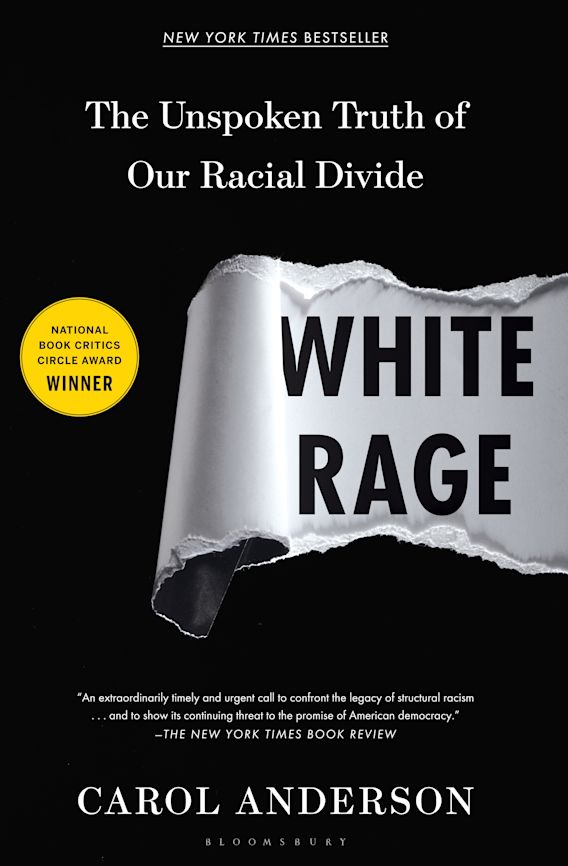
Call Number: HD1491.S63 C66 2017
ISBN: 9781632864123
Publication Date: 2017
The end of the Civil War and Reconstruction was greeted with the Black Codes and Jim Crow; the Supreme Court's landmark 1954 Brown v. Board of Education decision was met with the shutting down of public schools throughout the South while taxpayer dollars financed segregated white private schools; the Civil Rights Act of 1964 and Voting Rights Act of 1965 triggered a coded but powerful response, the so-called Southern Strategy and the War on Drugs that disenfranchised millions of African Americans while propelling presidents Nixon and Reagan into the White House. Carefully linking these and other historical flash points when social progress for African Americans was countered by deliberate and cleverly crafted opposition, Anderson pulls back the veil that has long covered actions made in the name of protecting democracy, fiscal responsibility, or protection against fraud, rendering visible the long lineage of white rage. Compelling and dramatic in the unimpeachable history it relates, White Rage will add an important new dimension to the national conversation about race in America.

Call Number: E185.61 .C633 2014
ISBN: 9780871405357
Publication Date: 2014
Also available as an ebook
Visiting Martin Luther King Jr. during the Montgomery, Alabama, bus boycott, journalist William Worthy almost sat on a loaded pistol. "Just for self-defense," King assured him. It was not the only weapon King kept for such a purpose; one of his advisors remembered the reverend’s Montgomery, Alabama, home as "an arsenal." Like King, many ostensibly "nonviolent" civil rights activists embraced their constitutional right to self-protection—yet this crucial dimension of the Afro-American freedom struggle has been long ignored by history. In This Nonviolent Stuff’ll Get You Killed, Charles E. Cobb Jr. recovers this history, describing the vital role that armed self-defense has played in the survival and liberation of black communities. Drawing on his experiences in the civil rights movement and giving voice to its participants, Cobb lays bare the paradoxical relationship between the nonviolent civil rights struggle and the long history and importance of African Americans taking up arms to defend themselves against white supremacist violence.

Call Number: PR9265.9.C55 Z46 2008
ISBN: 9780816654741
Publication Date: 2008
Also available as an ebook
Born in a Jamaican still under British rule, Michelle Cliff embraced her many identities shaped by her experiences with the forces of colonialism and oppression: a light-skinned Creole, a lesbian, and an immigrant in both England and the United States. If I Could Write This in Fire begins by tracing her transatlantic journey from Jamaica to England, coalescing around a graceful, elliptical account of her childhood friendship with Zoe, who is dark-skinned and from an impoverished, rural background; the divergent life courses that each is forced to take; and the class and color tensions that shape their lives as adults. The personal is interspersed with fragments of Jamaica’s history and the plight of people of color living both under imperial rule and in contemporary Britain. Cliff also writes about the discovery of her distinctive, diasporic literary voice, recalls her wild colonial girlhood and sexual awakening, and recounts traveling through an American landscape of racism, colonialism, and genocide.

Call Number: PS3619.M5748 A6 2017
ISBN: 9781555977856
Publication Date: 2017
Smith's unflinching poetry addresses race, class, sexuality, faith, social justice, mortality, and the challenges of living HIV positive at the intersection of black and queer identity. The collection opens with a heartrending sequence that imagines an afterlife for black men shot by police, a place where suspicion, violence, and grief are forgotten and replaced with the safety, love, and longevity they deserved on earth. "Dear White America," which Smith performed at the 2014 Rustbelt Midwest Region Poetry Slam, has as strong an impact on the page as it did on the spoken word stage. Smith's courage and hope amidst the struggle for unity in America will humble and uplift you.
Also found in the LGBTQ+ Authors section!

Call Number: E185.97 .D836 2015
ISBN: 9780300195828
Publication Date: 2015
Also available as an ebook
In this book, originally published in 1903, W. E. B. Du Bois has collected fourteen of his own essays about life after the Civil War, especially in the South. While the book predominantly deals with Black society and the life of “freedmen,” it also discusses how white society evolved after Emancipation. Throughout the text, Du Bois presents specific examples of racial injustice and inequality in the South. Before each essay, Du Bois includes a poem (or an excerpt from a poem or song) appropriate to the essay’s subject matter. Every inclusion is “a bar of the Sorrow Songs,—some echo of haunting melody from the only American music which welled up from the black souls in the dark past.” Du Bois revisits the significance of these inclusions at the end of the book.

Call Number: E185.615 .F526 2016
ISBN: 9781501126345
Publication Date: 2016
Also available as an ebook
The Fire This Time shines a light on the darkest corners of our history, wrestles with our current predicament, and imagines a better future. Envisioned as a response to The Fire Next Time, James Baldwin’s groundbreaking 1963 essay collection, these contemporary writers reflect on the past, present, and future of race in America. We’ve made significant progress in the fifty-odd years since Baldwin’s essays were published, but America is a long and painful distance away from a “post-racial society”—a truth we must confront if we are to continue to work towards change. Baldwin’s “fire next time” is now upon us, and it needs to be talked about; The Fire This Time “seeks to place the shock of our own times into historical context and, most importantly, to move these times forward” (Vogue).

Call Number: HQ1410 B49 2019
ISBN: 9780816539772
Publication Date: 2019
Also available as an ebook
A series of essays that reads like a critical memoir, this work queries the function and implications of politicized Blackness, Black feminism, and queerness. Bey binds together his personal experiences with social justice work at the New York–based Audre Lorde Project, growing up in Philly, and rigorous explorations of the iconoclasm of theorists of Black studies and Black feminism. Bey’s voice recalibrates itself playfully on a dime, creating a collection that tarries in both academic and nonacademic realms.

Call Number: PS3607.Y37 H66 2016
ISBN: 9781101947135
Publication Date: 2016
Also available as an ebook
Two half-sisters, Effia and Esi, are born into different villages in eighteenth-century Ghana. Effia is married off to an Englishman and lives in comfort in the palatial rooms of Cape Coast Castle. Unbeknownst to Effia, her sister, Esi, is imprisoned beneath her in the castle's dungeons, sold with thousands of others into the Gold Coast's booming slave trade, and shipped off to America, where her children and grandchildren will be raised in slavery. One thread of Homegoing follows Effia's descendants through centuries of warfare in Ghana, as the Fante and Asante nations wrestle with the slave trade and British colonization. The other thread follows Esi and her children into America. From the plantations of the South to the Civil War and the Great Migration, from the coal mines of Pratt City, Alabama, to the jazz clubs and dope houses of twentieth-century Harlem, right up through the present day, Homegoing makes history visceral, and captures, with singular and stunning immediacy, how the memory of captivity came to be inscribed in the soul of a nation.

Call Number: E185.615 .C6335 2015
ISBN: 9780812993547
Publication Date: 2015
Ta-Nehisi Coates offers a powerful new framework for understanding our nation’s history and current crisis. Americans have built an empire on the idea of “race,” a falsehood that damages us all but falls most heavily on the bodies of black women and men—bodies exploited through slavery and segregation, and, today, threatened, locked up, and murdered out of all proportion. Coates shares with his son—and readers—the story of his awakening to the truth about his place in the world through a series of revelatory experiences, from Howard University to Civil War battlefields, from the South Side of Chicago to Paris, from his childhood home to the living rooms of mothers whose children’s lives were taken as American plunder. Beautifully woven from personal narrative, reimagined history, and fresh, emotionally charged reportage, Between the World and Me clearly illuminates the past, bracingly confronts our present, and offers a transcendent vision for a way forward.

Call Number: E185.89.F66 T95 2017
ISBN: 9780062379290
Publication Date: 2017
A renowned culinary historian offers a fresh perspective on our most divisive cultural issue, race, in this illuminating memoir of Southern cuisine and food culture that traces his ancestry—both black and white—through food, from Africa to America and slavery to freedom.
Southern food is integral to the American culinary tradition, yet the question of who “owns” it is one of the most provocative touch points in our ongoing struggles over race. In this unique memoir, culinary historian Michael W. Twitty takes readers to the white-hot center of this fight, tracing the roots of his own family and the charged politics surrounding the origins of soul food, barbecue, and all Southern cuisine.

Call Number: E185.86 .K46 2020
ISBN: 9780525560548
Publication Date: 2020
All too often the focus of mainstream feminism is not on basic survival for the many, but on increasing privilege for the few. Meeting basic needs is a feminist issue. Food insecurity, the living wage, and access to education are feminist issues. The fight against racism, ableism, and transmisogyny are all feminist issues. White feminists often fail to see how race, class, sexual orientation, and disability intersect with gender. How can feminists stand in solidarity as a movement when there is a distinct likelihood that some women are oppressing others? Insightful, incendiary, and ultimately hopeful, Hood Feminism is both an irrefutable indictment of a movement in flux and also clear-eyed assessment of how to save it.
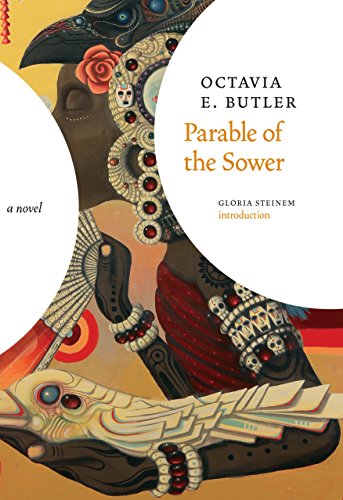
Call Number: PS3552.U827 P37 1993
ISBN: 9780941423991
Publication Date: 1993
Also available as an ebook
When global climate change and economic crises lead to social chaos in the early 2020s, California becomes full of dangers, from pervasive water shortage to masses of vagabonds who will do anything to live to see another day. Fifteen-year-old Lauren Olamina lives inside a gated community with her preacher father, family, and neighbors, sheltered from the surrounding anarchy. In a society where any vulnerability is a risk, she suffers from hyperempathy, a debilitating sensitivity to others’ emotions. Precocious and clear-eyed, Lauren must make her voice heard in order to protect her loved ones from the imminent disasters her small community stubbornly ignores. But what begins as a fight for survival soon leads to something much more: the birth of a new faith and a startling vision of human destiny.
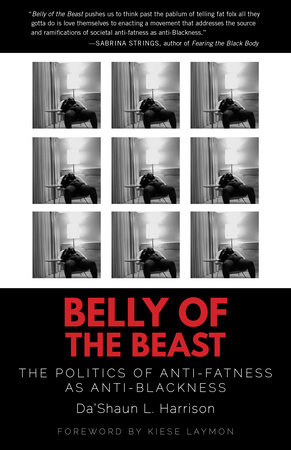
Call Number: E185.86 .H376 2021
ISBN: 9781623175979
Publication Date: 2021
Da’Shaun Harrison–a fat, Black, disabled, and nonbinary trans writer–offers an incisive, fresh, and precise exploration of anti-fatness as anti-Blackness, foregrounding the state-sanctioned murders of fat Black men and trans and nonbinary masculine people in historical analysis. Policing, disenfranchisement, and invisibilizing of fat Black men and trans and nonbinary masculine people are pervasive, insidious ways that anti-fat anti-Blackness shows up in everyday life. Fat people can be legally fired in 49 states for being fat and they’re more likely to be houseless. Fat people die at higher rates from misdiagnosis or nontreatment and fat women are more likely to be sexually assaulted. And at the intersections of fatness, Blackness, disability, and gender, these abuses are exacerbated. Taking on desirability politics, the limitations of gender, the connection between anti-fatness and carcerality, and the incongruity of “health” for the Black fat, Harrison viscerally and vividly illustrates the myriad harms of anti-fat anti-Blackness.

Call Number: E185.97.A69 A3 2018
ISBN: 9781501178856
Publication Date: 2018
Equality for LGBTQ people has come a long way and all, but voices of persons of color within the community are still often silenced, and being Black in America is…well, have you watched the news? With the characteristic wit and candor that have made him one of today’s boldest writers on social issues, I Can’t Date Jesus is Michael Arceneaux’s impassioned, forthright, and refreshing look at minority life in today’s America. Leaving no bigoted or ignorant stone unturned, he describes his journey in learning to embrace his identity when the world told him to do the opposite. He writes about coming out to his mother; growing up in Houston, Texas; being approached for the priesthood; his obstacles in embracing intimacy that occasionally led to unfortunate fights with fire ants and maybe fleas; and the persistent challenges of young people who feel marginalized and denied the chance to pursue their dreams.
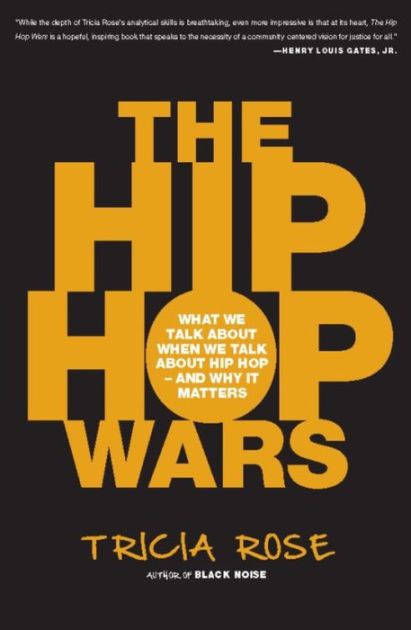
Call Number: HN59.2 .R68 2008
ISBN: 9780465008971
Publication Date: 2008
Also available as an ebook
Hip hop is a distinctive form of black art in America-from Tupac to the Pulitzer Prize-winning Kendrick Lamar, hip hop has long given voice to the African American experience. As scholar and cultural critic Tricia Rose argues, hip hop, in fact, has become one of the primary ways we talk about race in the United States. But hip hop is in crisis. For years, the most commercially successful hip hop has become increasingly saturated with caricatures of black gangstas, thugs, pimps, and hos. This both represents and feeds a problem in black American culture. Or does it? In The Hip-Hop Wars, Rose explores the most crucial issues underlying the polarized claims on each side of the debate: Does hip hop cause violence, or merely reflect a violent ghetto culture? Is hip hop sexist, or are its detractors simply anti-sex? Does the portrayal of black culture in hip hop undermine black advancement?
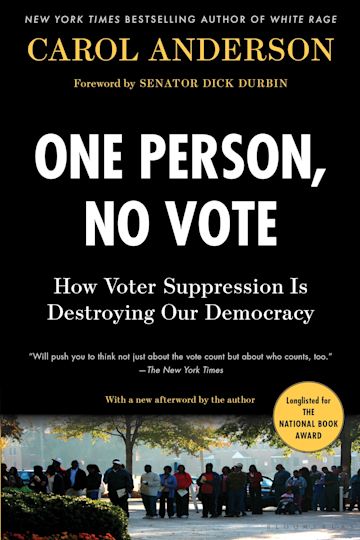
Call Number: JK1924 .A54 2019b
ISBN: 9781635571394
Publication Date: 2019
Also available as an ebook
In her New York Times bestseller White Rage, Carol Anderson laid bare an insidious history of policies that have systematically impeded black progress in America, from 1865 to our combustible present. With One Person, No Vote, she chronicles a related history: the rollbacks to African American participation in the vote since the 2013 Supreme Court decision that eviscerated the Voting Rights Act of 1965. Known as the Shelby ruling, this decision effectively allowed districts with a demonstrated history of racial discrimination to change voting requirements without approval from the Department of Justice.
Focusing on the aftermath of Shelby, Anderson follows the astonishing story of government-dictated racial discrimination unfolding before our very eyes as more and more states adopt voter suppression laws. In gripping, enlightening detail she explains how voter suppression works, from photo ID requirements to gerrymandering to poll closures. In a powerful new afterword, she examines the repercussions of the 2018 midterm elections. And with vivid characters, she explores the resistance: the organizing, activism, and court battles to restore the basic right to vote to all Americans.
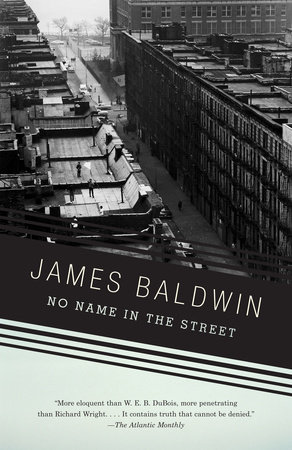
Call Number: E185.615 .B28 2007
ISBN: 9780307275929
Publication Date: 2007
In this stunningly personal document, James Baldwin remembers in vivid details the Harlem childhood that shaped his early consciousness and the later events that scored his heart with pain—the murders of Martin Luther King and Malcolm X, his sojourns in Europe and in Hollywood, and his return to the American South to confront a violent America face-to-face.

Call Number: E185.615 .M38 2017
ISBN: 9781942094470
Publication Date: 2017
In this groundbreaking book, therapist Resmaa Menakem examines the damage caused by racism in America from the perspective of trauma and body-centered psychology. The body is where our instincts reside and where we fight, flee, or freeze, and it endures the trauma inflicted by the ills that plague society. Menakem argues this destruction will continue until Americans learn to heal the generational anguish of white supremacy, which is deeply embedded in all our bodies. Our collective agony doesn't just affect African Americans. White Americans suffer their own secondary trauma as well. So do blue Americans--our police. My Grandmother's Hands is a call to action for all of us to recognize that racism is not only about the head, but about the body, and introduces an alternative view of what we can do to grow beyond our entrenched racialized divide.
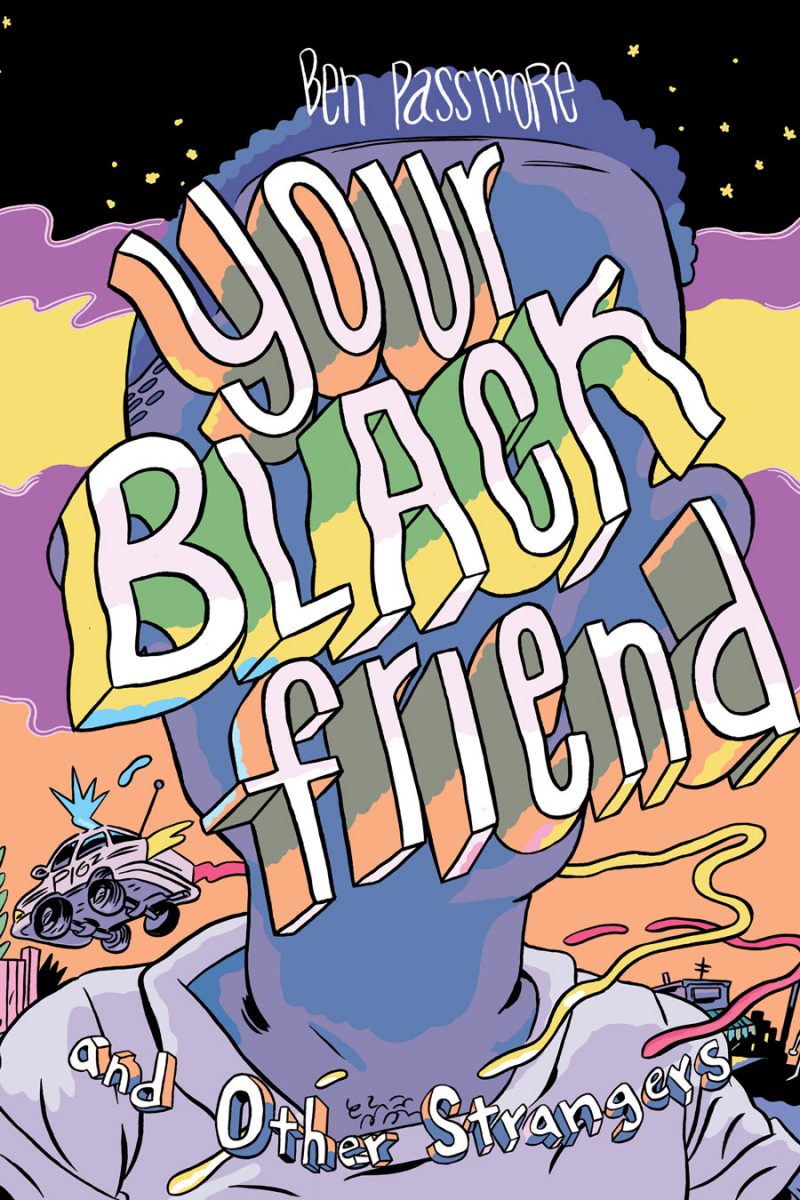
Call Number: E185.625 .P372 2018
ISBN: 9781945509209
Publication Date: 2018
Your Black Friend and Other Strangers collects over 100 pages of honest, thought-provoking, argumentative, and humorous comics by Ben Passmore. These comics are connected by concerns Ben has had about race, identity, and modern societal structures. The book opens with the eponymous comic, a letter to his white friends about his own experiences trying to navigate America as a black man. It’s a sharp, funny, honest comic that is grounded, centered, and gets better every time you read it. Your Black Friend sets the tone for the rest of the book, as Ben writes comics essays about confederate monuments, gun safety, Trump, not being “woke enough,” and his experiences getting arrested. Ben also spins revenge fantasies against cops, and self-reflective allegories about identity, capitalism, and failure.
Call Number: HX436.5 .R63 1983
ISBN: 9780862321260
Publication Date: 1983
In this ambitious work, first published in 1983, Cedric Robinson demonstrates that efforts to understand black people's history of resistance solely through the prism of Marxist theory are incomplete and inaccurate. Marxist analyses tend to presuppose European models of history and experience that downplay the significance of black people and black communities as agents of change and resistance. Black radicalism must be linked to the traditions of Africa and the unique experiences of blacks on western continents, Robinson argues, and any analyses of African American history need to acknowledge this. To illustrate his argument, Robinson traces the emergence of Marxist ideology in Europe, the resistance by blacks in historically oppressive environments, and the influence of both of these traditions on such important twentieth-century black radical thinkers as W. E. B. Du Bois, C. L. R. James, and Richard Wright.
Call Number: HX828 .E78 2021
ISBN: 9780745345819
Publication Date: 2021
'A powerful - even startling - book that challenges the shibboleths of 'white' anarchism'. Its analysis of police violence and the threat of fascism are as important now as they were at the end of the 1970s. Perhaps more so' - Peter James Hudson, Black Agenda Report Anarchism and the Black Revolution first connected Black radical thought to anarchist theory in 1979. Now amidst a rising tide of Black political organizing, this foundational classic written by a key figure of the Civil Rights movement is republished with a wealth of original material for a new generation. Anarchist theory has long suffered from a whiteness problem. This book places its critique of both capitalism and racism firmly at the centre of the text. Making a powerful case for the building of a Black revolutionary movement that rejects sexism, homophobia, militarism and racism, Lorenzo Kom'boa Ervin counters the lies and distortions about anarchism spread by its left- and right-wing opponents alike. New material includes an interview with writer and activist William C. Anderson, as well as new essays, and a contextualizing biography of the author's inspiring life.
Call Number: E185.97.B215 A3 2019
ISBN: 9781629633770
Publication Date: 2019
Kuwasi Balagoon was a participant in the Black Liberation struggle from the 1960s until his death in prison in 1986. A member of the Black Panther Party and defendant in the infamous Panther 21 case, Balagoon went underground with the Black Liberation Army (BLA). Captured and convicted of various crimes against the State, he spent much of the 1970s in prison, escaping twice. After each escape, he went underground and resumed BLA activity. Balagoon was unusual for his time in several ways. He combined anarchism with Black nationalism, he broke the rules of sexual and political conformity that surrounded him, he took up arms against the white-supremacist state--all the while never shying away from developing his own criticisms of the weaknesses within the movements. His eloquent trial statements and political writings, as much as his poetry and excerpts from his prison letters, are all testimony to a sharp and iconoclastic revolutionary who was willing to make hard choices and fully accept the consequences. Balagoon was captured for the last time in December 1981, charged with participating in an armored truck expropriation in West Nyack, New York, an action in which two police officers and a money courier were killed. Convicted and sentenced to life imprisonment, he died of an AIDS-related illness on December 13, 1986. The first part of this book consists of contributions by those who knew or were touched by Balagoon. The second section consists of court statements and essays by Balagoon himself, including several documents that were absent from previous editions and have never been published before. The third consists of excerpts from letters Balagoon wrote from prison. A final fourth section consists of a historical essay by Akinyele Umoja and an extensive intergenerational roundtable discussion of the significance of Balagoon's life and thoughts today.
Call Number: HD8039.C662 U65 2000
ISBN: 9780826212719
Publication Date: 2000
Also available as an ebook
Vividly revealing the challenges faced by a group of migrant workers who eventually formed the multiracial town of Randolph, Arizona, Not All Okies Are White is a brilliant, spellbinding celebration of the resilience and adaptability of people too often ignored by history texts. Recognizing the black exodus to the American West as an overlooked but integral chapter in American history, Geta LeSeur fills the void by extending her research beyond the Mississippi River and the Mason-Dixon line, examining close-up the personal lives of third- and fourth-generation descendants of pre-Emancipation blacks. In this first full-length study to explore the migrant life of any nonwhite group within the United States and the first to focus specifically on a primarily black town in the Southwest, LeSeur deftly uncovers the stepping-stone pattern of black movement west of the Mississippi into Arkansas, Oklahoma, and Texas, and consequent migrations to Arizona and California imposed by economic and social conditions. Not All Okies Are White recaptures the ways of life for black migrant workers, as well as Hispanics and Native Americans, in the first half of the century through richly detailed interviews of the families of Randolph's founders. Through the words of each narrator, these personal stories recount work experiences and survival strategies, offering new insights into the people's relationship to the land. The narratives reveal a creative tension between place and identity, movement and migration. LeSeur provides a historical, cultural, and literary context for the oral histories by incorporating news articles, information culled from historical society archives, analyses of films and novels, advertisements, and photographs. An innovative blend of history telling and literary analysis, Not All Okies Are White describes LeSeur's acquaintance with and growing involvement in the lives of the residents of Randolph and surrounding farm communities. The result is a highly accessible cross-disciplinary study that will appeal to scholars and general readers interested in oral history, African American history, multicultural studies, and women's studies.

Call Number: E185.625 .T38 1997
ISBN: 9780465060689
Publication Date: 1997
Also available as an ebook
Walk into any racially mixed secondary school and you will see young people clustered in their own groups according to race. Is this self-segregation a problem to address or a coping strategy? Beverly Daniel Tatum, a renowned psychology Professor, guides us through how racial identity develops, from very young children all the way to adulthood, in black families, white families, and mixed-race families, and helps us understand what we can do to break the silence, have better conversations with our children and with each other about race, and build a better world. A mainstay on the bookshelves of American readers since 1998, and substantially revised and updated in 2017, this evergreen bestseller is essential reading for anyone interested in understanding the dynamics of race.

Call Number: E185.86 B52 2019
ISBN: 9780816539536
Publication Date: 2019
Also available as an ebook
Hashtag or trademark, personal or collective expression, #BlackGirlMagic is an articulation of the resolve of Black women and girls to triumph in the face of structural oppressions. The online life of #BlackGirlMagic insists on the visibility of Black women and girls as aspirational figures. But while the notion of Black girl magic spreads in cyberspace, the question remains: how is Black girl magic experienced offline? The chapters demonstrate how Black girl magic is embodied by four elements enacted both on- and offline: building community, challenging dehumanizing representations, increasing visibility, and offering restorative justice for violence. Black Girl Magic Beyond the Hashtag shows how Black girls and women foster community, counter invisibility, engage in restorative acts, and create spaces for freedom. Intersectional and interdisciplinary, the contributions in this volume bridge generations and collectively push the boundaries of Black feminist thought.

Call Number: ML3556 .R32 2003
ISBN: 9780520210486
Publication Date: 2003
Also available as an ebook
This powerful book covers the vast and various terrain of African American music, from bebop to hip-hop. Guthrie P. Ramsey, Jr., begins with an absorbing account of his own musical experiences with family and friends on the South Side of Chicago, evoking Sunday-morning worship services, family gatherings with food and dancing, and jam sessions at local nightclubs. This lays the foundation for a brilliant discussion of how musical meaning emerges in the private and communal realms of lived experience and how African American music has shaped and reflected identities in the black community. Deeply informed by Ramsey's experience as an accomplished musician, a sophisticated cultural theorist, and an enthusiast brought up in the community he discusses, Race Music explores the global influence and popularity of African American music, its social relevance, and key questions regarding its interpretation and criticism.

Call Number: E98.R28 K73 2013
ISBN: 9781469607108
Publication Date: 2013
Also available as an ebook
From the late eighteenth century through the end of the Civil War, Choctaw and Chickasaw Indians bought, sold, and owned Africans and African Americans as slaves, a fact that persisted after the tribes' removal from the Deep South to Indian Territory. The tribes formulated racial and gender ideologies that justified this practice and marginalized free black people in the Indian nations well after the Civil War and slavery had ended. Through the end of the nineteenth century, ongoing conflicts among Choctaw, Chickasaw, and U.S. lawmakers left untold numbers of former slaves and their descendants in the two Indian nations without citizenship in either the Indian nations or the United States. In this groundbreaking study, Barbara Krauthamer rewrites the history of southern slavery, emancipation, race, and citizenship to reveal the centrality of Native American slaveholders and the black people they enslaved

Call Number: E185.615 .F526 2016
ISBN: 9781501126345
Publication Date: 2016
Also available as an ebook
The Fire This Time shines a light on the darkest corners of our history, wrestles with our current predicament, and imagines a better future. Envisioned as a response to The Fire Next Time, James Baldwin’s groundbreaking 1963 essay collection, these contemporary writers reflect on the past, present, and future of race in America. We’ve made significant progress in the fifty-odd years since Baldwin’s essays were published, but America is a long and painful distance away from a “post-racial society”—a truth we must confront if we are to continue to work towards change. Baldwin’s “fire next time” is now upon us, and it needs to be talked about; The Fire This Time “seeks to place the shock of our own times into historical context and, most importantly, to move these times forward” (Vogue).

Call Number: HQ1410 B49 2019
ISBN: 9780816539772
Publication Date: 2019
Also available as an ebook
A series of essays that reads like a critical memoir, this work queries the function and implications of politicized Blackness, Black feminism, and queerness. Bey binds together his personal experiences with social justice work at the New York–based Audre Lorde Project, growing up in Philly, and rigorous explorations of the iconoclasm of theorists of Black studies and Black feminism. Bey’s voice recalibrates itself playfully on a dime, creating a collection that tarries in both academic and nonacademic realms.

Call Number: HN59.2 .R68 2008
ISBN: 9780465008971
Publication Date: 2008
Also available as an ebook
Hip hop is a distinctive form of black art in America-from Tupac to the Pulitzer Prize-winning Kendrick Lamar, hip hop has long given voice to the African American experience. As scholar and cultural critic Tricia Rose argues, hip hop, in fact, has become one of the primary ways we talk about race in the United States. But hip hop is in crisis. For years, the most commercially successful hip hop has become increasingly saturated with caricatures of black gangstas, thugs, pimps, and hos. This both represents and feeds a problem in black American culture. Or does it? In The Hip-Hop Wars, Rose explores the most crucial issues underlying the polarized claims on each side of the debate: Does hip hop cause violence, or merely reflect a violent ghetto culture? Is hip hop sexist, or are its detractors simply anti-sex? Does the portrayal of black culture in hip hop undermine black advancement?

Call Number: E185.615 .M38 2017
ISBN: 9781942094470
Publication Date: 2017
In this groundbreaking book, therapist Resmaa Menakem examines the damage caused by racism in America from the perspective of trauma and body-centered psychology. The body is where our instincts reside and where we fight, flee, or freeze, and it endures the trauma inflicted by the ills that plague society. Menakem argues this destruction will continue until Americans learn to heal the generational anguish of white supremacy, which is deeply embedded in all our bodies. Our collective agony doesn't just affect African Americans. White Americans suffer their own secondary trauma as well. So do blue Americans--our police. My Grandmother's Hands is a call to action for all of us to recognize that racism is not only about the head, but about the body, and introduces an alternative view of what we can do to grow beyond our entrenched racialized divide.
Call Number: GE230 .W37 2019
ISBN: 9780316509435
Publication Date: 2019
From injuries caused by lead poisoning to the devastating effects of atmospheric pollution, infectious disease, and industrial waste, Americans of color are harmed by environmental hazards in staggeringly disproportionate numbers. These deadly environments create another insidious and often overlooked consequence: robbing communities of color, and America as a whole, of intellectual power. Washington takes apart the spurious notion of intelligence as an inherited trait using data that instead point to a different cause of the reported African American-white IQ gap: environmental racism--a confluence of racism and other institutional factors that relegate marginalized communities to living and working near sites of toxic waste, pollution, and insufficient sanitation services. She investigates heavy metals, neurotoxins, deficient prenatal care, bad nutrition, and even pathogens as chief agents influencing intelligence to explain why communities of color are disproportionately affected—and what can be done to remedy this devastating problem.

Call Number: E185.625 .P372 2018
ISBN: 9781945509209
Publication Date: 2018
Your Black Friend and Other Strangers collects over 100 pages of honest, thought-provoking, argumentative, and humorous comics by Ben Passmore. These comics are connected by concerns Ben has had about race, identity, and modern societal structures. The book opens with the eponymous comic, a letter to his white friends about his own experiences trying to navigate America as a black man. It’s a sharp, funny, honest comic that is grounded, centered, and gets better every time you read it. Your Black Friend sets the tone for the rest of the book, as Ben writes comics essays about confederate monuments, gun safety, Trump, not being “woke enough,” and his experiences getting arrested. Ben also spins revenge fantasies against cops, and self-reflective allegories about identity, capitalism, and failure.
Call Number: HX436.5 .R63 1983
ISBN: 9780862321260
Publication Date: 1983
In this ambitious work, first published in 1983, Cedric Robinson demonstrates that efforts to understand black people's history of resistance solely through the prism of Marxist theory are incomplete and inaccurate. Marxist analyses tend to presuppose European models of history and experience that downplay the significance of black people and black communities as agents of change and resistance. Black radicalism must be linked to the traditions of Africa and the unique experiences of blacks on western continents, Robinson argues, and any analyses of African American history need to acknowledge this. To illustrate his argument, Robinson traces the emergence of Marxist ideology in Europe, the resistance by blacks in historically oppressive environments, and the influence of both of these traditions on such important twentieth-century black radical thinkers as W. E. B. Du Bois, C. L. R. James, and Richard Wright.
Call Number: Books That Matter HX828 .E78 2021
ISBN: 9780745345819
Publication Date: 2021
'A powerful - even startling - book that challenges the shibboleths of 'white' anarchism'. Its analysis of police violence and the threat of fascism are as important now as they were at the end of the 1970s. Perhaps more so' - Peter James Hudson, Black Agenda Report Anarchism and the Black Revolution first connected Black radical thought to anarchist theory in 1979. Now amidst a rising tide of Black political organizing, this foundational classic written by a key figure of the Civil Rights movement is republished with a wealth of original material for a new generation. Anarchist theory has long suffered from a whiteness problem. This book places its critique of both capitalism and racism firmly at the centre of the text. Making a powerful case for the building of a Black revolutionary movement that rejects sexism, homophobia, militarism and racism, Lorenzo Kom'boa Ervin counters the lies and distortions about anarchism spread by its left- and right-wing opponents alike. New material includes an interview with writer and activist William C. Anderson, as well as new essays, and a contextualizing biography of the author's inspiring life.
Call Number: E185.97.B215 A3 2019
ISBN: 9781629633770
Publication Date: 2019
Kuwasi Balagoon was a participant in the Black Liberation struggle from the 1960s until his death in prison in 1986. A member of the Black Panther Party and defendant in the infamous Panther 21 case, Balagoon went underground with the Black Liberation Army (BLA). Captured and convicted of various crimes against the State, he spent much of the 1970s in prison, escaping twice. After each escape, he went underground and resumed BLA activity. Balagoon was unusual for his time in several ways. He combined anarchism with Black nationalism, he broke the rules of sexual and political conformity that surrounded him, he took up arms against the white-supremacist state--all the while never shying away from developing his own criticisms of the weaknesses within the movements. His eloquent trial statements and political writings, as much as his poetry and excerpts from his prison letters, are all testimony to a sharp and iconoclastic revolutionary who was willing to make hard choices and fully accept the consequences. Balagoon was captured for the last time in December 1981, charged with participating in an armored truck expropriation in West Nyack, New York, an action in which two police officers and a money courier were killed. Convicted and sentenced to life imprisonment, he died of an AIDS-related illness on December 13, 1986. The first part of this book consists of contributions by those who knew or were touched by Balagoon. The second section consists of court statements and essays by Balagoon himself, including several documents that were absent from previous editions and have never been published before. The third consists of excerpts from letters Balagoon wrote from prison. A final fourth section consists of a historical essay by Akinyele Umoja and an extensive intergenerational roundtable discussion of the significance of Balagoon's life and thoughts today.
Call Number: HD8039.C662 U65 2000
ISBN: 9780826212719
Publication Date: 2000
Also available as an ebook
Vividly revealing the challenges faced by a group of migrant workers who eventually formed the multiracial town of Randolph, Arizona, Not All Okies Are White is a brilliant, spellbinding celebration of the resilience and adaptability of people too often ignored by history texts. Recognizing the black exodus to the American West as an overlooked but integral chapter in American history, Geta LeSeur fills the void by extending her research beyond the Mississippi River and the Mason-Dixon line, examining close-up the personal lives of third- and fourth-generation descendants of pre-Emancipation blacks. In this first full-length study to explore the migrant life of any nonwhite group within the United States and the first to focus specifically on a primarily black town in the Southwest, LeSeur deftly uncovers the stepping-stone pattern of black movement west of the Mississippi into Arkansas, Oklahoma, and Texas, and consequent migrations to Arizona and California imposed by economic and social conditions. Not All Okies Are White recaptures the ways of life for black migrant workers, as well as Hispanics and Native Americans, in the first half of the century through richly detailed interviews of the families of Randolph's founders. Through the words of each narrator, these personal stories recount work experiences and survival strategies, offering new insights into the people's relationship to the land. The narratives reveal a creative tension between place and identity, movement and migration. LeSeur provides a historical, cultural, and literary context for the oral histories by incorporating news articles, information culled from historical society archives, analyses of films and novels, advertisements, and photographs. An innovative blend of history telling and literary analysis, Not All Okies Are White describes LeSeur's acquaintance with and growing involvement in the lives of the residents of Randolph and surrounding farm communities. The result is a highly accessible cross-disciplinary study that will appeal to scholars and general readers interested in oral history, African American history, multicultural studies, and women's studies.

Call Number: PS3607.Y37 H66 2016
ISBN: 9781101947135
Publication Date: 2016
Also available as an ebook
Two half-sisters, Effia and Esi, are born into different villages in eighteenth-century Ghana. Effia is married off to an Englishman and lives in comfort in the palatial rooms of Cape Coast Castle. Unbeknownst to Effia, her sister, Esi, is imprisoned beneath her in the castle's dungeons, sold with thousands of others into the Gold Coast's booming slave trade, and shipped off to America, where her children and grandchildren will be raised in slavery. One thread of Homegoing follows Effia's descendants through centuries of warfare in Ghana, as the Fante and Asante nations wrestle with the slave trade and British colonization. The other thread follows Esi and her children into America. From the plantations of the South to the Civil War and the Great Migration, from the coal mines of Pratt City, Alabama, to the jazz clubs and dope houses of twentieth-century Harlem, right up through the present day, Homegoing makes history visceral, and captures, with singular and stunning immediacy, how the memory of captivity came to be inscribed in the soul of a nation.

Call Number: PS3539.O543 C3 1969
ISBN: 9780871405357
Publication Date: 1923
Also available as an ebook
Jean Toomer's Cane is one of the most significant works to come out of the Harlem Renaissance and is considered to be a masterpiece in American modernist literature due to its distinct structure and style. Visions of smoke, sugarcane, dusk, and flame permeate the Southern landscape: the Northern world is pictured as a harsher reality of asphalt streets. Impressionistic, sometimes surrealistic, the pieces are redolent of nature and Africa, with sensuous appeals to the eye and ear. First published in 1923 and told through a series of vignettes, Cane uses poetry, prose, and play-like dialogue to create a window into the varied lives of African Americans living in the rural South and urban North during a time when Jim Crow laws pervaded and racism reigned.

Call Number: PS3552.U827 P37 1993
ISBN: 9780941423991
Publication Date: 1993
Also available as an ebook
When global climate change and economic crises lead to social chaos in the early 2020s, California becomes full of dangers, from pervasive water shortage to masses of vagabonds who will do anything to live to see another day. Fifteen-year-old Lauren Olamina lives inside a gated community with her preacher father, family, and neighbors, sheltered from the surrounding anarchy. In a society where any vulnerability is a risk, she suffers from hyperempathy, a debilitating sensitivity to others’ emotions. Precocious and clear-eyed, Lauren must make her voice heard in order to protect her loved ones from the imminent disasters her small community stubbornly ignores. But what begins as a fight for survival soon leads to something much more: the birth of a new faith and a startling vision of human destiny.
Main Library | 1510 E. University Blvd.
Tucson, AZ 85721
(520) 621-6442

University Information Security and Privacy
© 2023 The Arizona Board of Regents on behalf of The University of Arizona.

